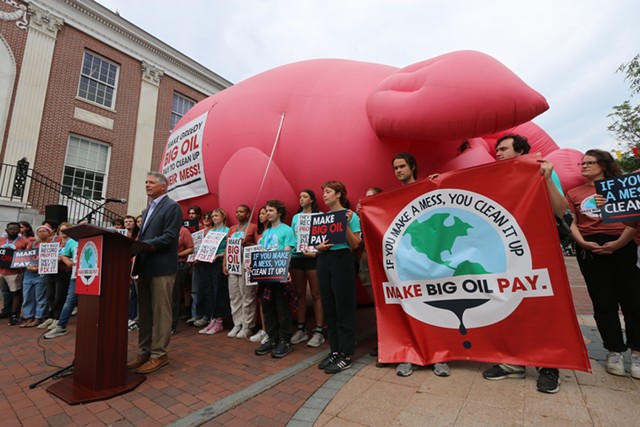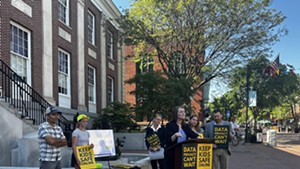
- File: Kevin McCallum ©️ Seven Days
- Activists discussing the bill last summer in Burlington
The Climate Superfund Act, S.259, was one of several measures Scott dealt with on Thursday night from a last-minute flurry of bills the legislature passed earlier this month in the waning days of the session. The measure aims to make big oil companies pay for the damage caused by climate change and the costs of adapting to it.
It’s based on the legal premise that major oil companies knew decades ago that their products would result in greenhouse gas emissions that would warm the planet, so they’re responsible for compensating Vermonters for the impact that shorter winters and more frequent flooding have had on the state.
In his message, Scott reiterated several concerns about the climate bill, including the likely cost of litigation.
“Taking on ‘Big Oil’ should not be taken lightly,” Scott said.
It makes little sense for tiny Vermont to fight the industry alone, he noted, instead of coordinating with bigger states with bigger budgets such as New York and California. He noted that some other national lawsuits involving GMOs, campaign finance and pharmaceutical marketing practices underscore the challenges ahead.
But he also said he understood the desire to recoup the costs of climate change, and noted that Attorney General Charity Clark and Treasurer Mike Pieciak were committed to the effort.
Related Vermont Senate Advances Bill to Make Big Oil Pay for Climate Crisis

Environmental groups celebrated the bill’s final passage.
“For too long, giant fossil fuel companies have knowingly lit the match of climate disruption without being required to do a thing to put out the fire,” Paul Burns, executive director of the Vermont Public Interest Research Group, said in a statement. “Finally, maybe for the first time anywhere, Vermont is going to hold the companies most responsible for climate-driven floods, fires and heat waves financially accountable for a fair share of the damages they’ve caused.”
Vermont Natural Resources Council, Vermont Conservation Voters, and Conservation Law Foundation all also lauded the bill’s passage.
S.259 would create a fund managed by the state treasurer. A study would determine the amount of fossil fuels sold in the state by major oil companies from January 1, 1995, through 2024.
Only companies that sold enough fuel to create more than 1 billion tons of carbon emissions over that period would be liable. The treasurer would demand payment from the companies. If and when those payments are received, the money could be used only to mitigate climate damage: by buying out flooded homes, upgrading public infrastructure or hardening the electrical grid against damage. Lengthy lawsuits are a virtual certainty.
“We know that Big Oil will fight this in the courts,” Rep. Martin LaLonde (D-South Burlington), chair of the House Judiciary Committee, said in a statement.
But LaLonde, an attorney who said his committee worked closely with legal scholars to shape the bill, said he believes Vermont has “a solid legal case.”
“Most importantly, the stakes are too high – and the costs too steep for Vermonters – to release corporations that caused the mess from their obligation to help clean it up,” he said.
Related Reading Advocates Celebrate the Passage of Literacy Bill

S.25 bans perfluoroalkyl and polyfluoroalkyl substances, so-called "forever chemicals," along with other chemicals, from feminine hygiene products.
S.55 makes a number of changes to the state’s Open Meeting Law to make it easier for public bodies to conduct business online.
S.184 allows for a pilot program that would install automated traffic cameras in highway work zones to capture the license plates of speeding drivers and send them tickets.
S.204 aims to improve how reading is taught in Vermont schools by requiring evidence-based literacy instruction and early screening to identify those at risk for reading challenges.
S.206 makes Juneteenth a state holiday.
H.534 increases penalties for shoplifting if the cumulative total of stolen goods is more than $900 over a 14-day period.
H.563 makes it easier to prosecute people who steal or enter cars that don't belong to them.















Comments
Comments are closed.
From 2014-2020, Seven Days allowed readers to comment on all stories posted on our website. While we've appreciated the suggestions and insights, right now Seven Days is prioritizing our core mission — producing high-quality, responsible local journalism — over moderating online debates between readers.
To criticize, correct or praise our reporting, please send us a letter to the editor or send us a tip. We’ll check it out and report the results.
Online comments may return when we have better tech tools for managing them. Thanks for reading.